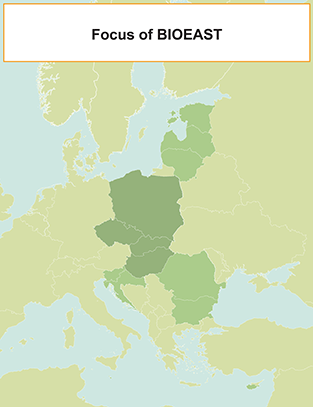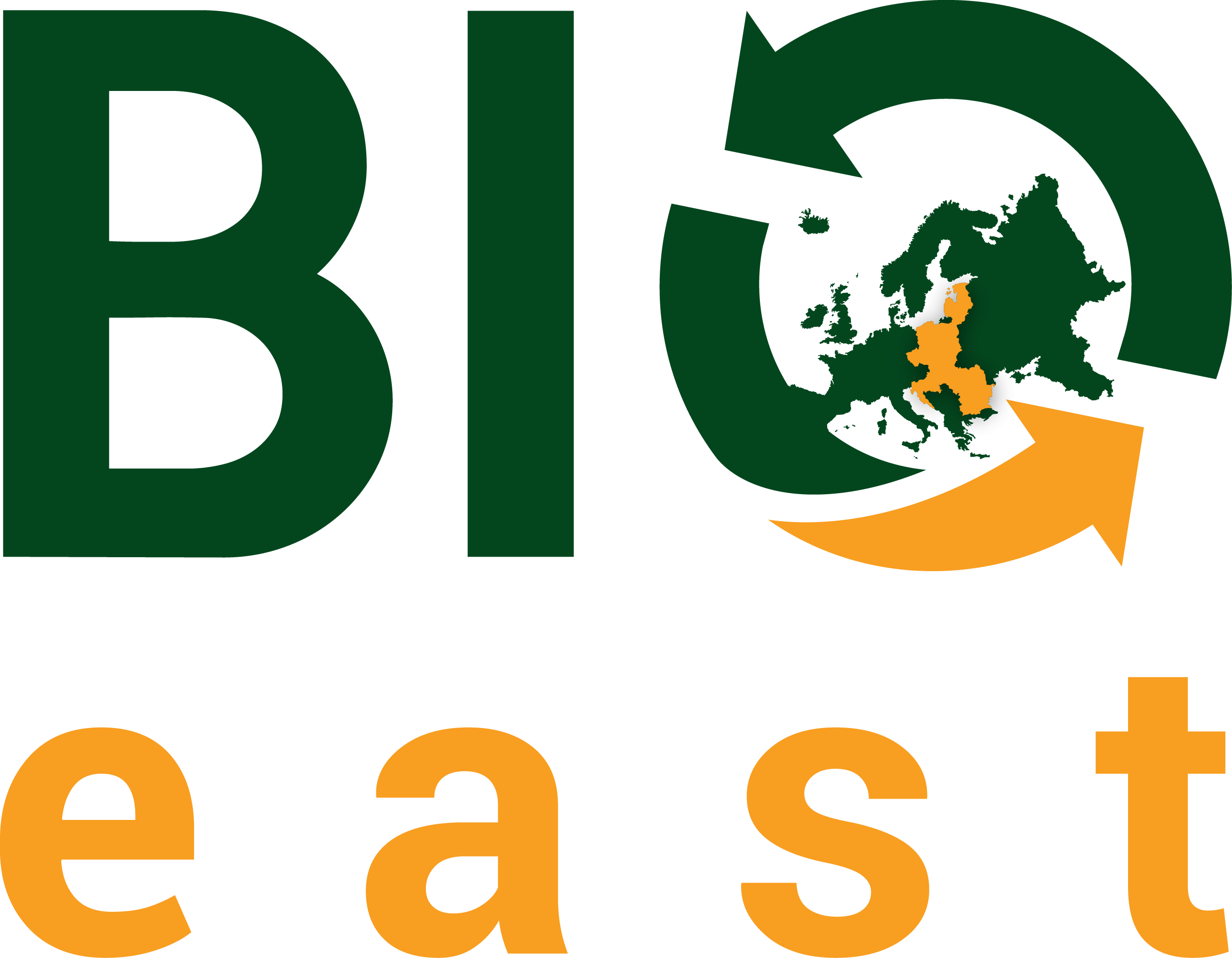BIOEAST – CENTRAL AND EASTERN EUROPEAN INITIATIVE FOR KNOWLEDGE-BASED AGRICULTURE, AQUACULTURE AND FORESTRY IN THE BIOECONOMY.

The political initiative started by the Visegrad Group Countries: Czech Republic, Hungary, Poland, Slovakia, and joined by Bulgaria, Croatia, Latvia, Lithuania, Republic of Estonia, Romania, Slovenia
The Central-Eastern European Initiative for Knowledge-based Agriculture, Aquaculture and Forestry in the Bioeconomy – BIOEAST – offers a common political commitment and shared strategic research and innovation framework for working towards sustainable bioeconomies in the Central and Eastern European (CEE) countries.
WHAT IS THE CHALLENGE OF BIOEAST?
Over the last ten years the resources of the Common Agricultural Policy have helped the Central-Eastern European (CEE) regions to improve their agri-food, aquaculture, and forestry sectors, environment and rural areas, thus helping to increase the cohesion of the European Union (EU). We believe that in order to achieve further progress in sustainable growth of agriculture, aquaculture and forestry in the bioeconomy we have to shift the emphasis to research, innovation and transnational cooperation for knowledge-based development. It is a fact that the European Union sees significant internal disparities in terms of research and innovation performance as it is identified in the Innovation Union Scoreboard. Besides, due to low participation of CEE regions in H2020, high level of professional knowledge stays outside of the region. This is a major challenge, which is hindering the sustainable growth in the whole EU. Therefore, the „widening participation” – as one of the horizontal issues complementing the strategic orientations for Horizon2020 and Horizon Europe – needs to be strengthened. The low performance and visibility of knowledge-based agriculture, aquaculture and forestry in the bioeconomy in CEE regions is an issue which in the past months has been recognised and discussed at regional, national and macro-regional level by many stakeholders including farmers, researchers and policy makers. What we need now is cooperative action to reach synergies and improve our performance.
WHAT does IT OFFER?
The Central-Eastern European Initiative for Knowledge-based Agriculture, Aquaculture and Forestry in the Bioeconomy – BIOEAST – offers a shared strategic research and innovation framework for working towards the development of a sustainable bioeconomy in the Central and Eastern European (CEE) countries. The comparative advantage in the EU of the CEE countries, namely the sustainable biomass production and processing, could lead to the benefit of the society by creating jobs and growth in the private sector. The macro-region’s environmental, economic, societal, geopolitical, cultural and historical homogeneity and complexity could provide the framework conditions favourable to development of a sustainable circular bioeconomy. However, to achieve this goal, the traditional primary production and processing sectors must be modernized through a robust research and innovation initiative in bioeconomy. In fact, the research and innovation capacities of these countries are facing significant internal disparities, thus creating a barrier to the full completion of a European Research Area. Joint efforts are thus required to address present and future challenges successfully.
Along with the process of forming the BIOEAST Initiative and TWG establishment, 100+ stakeholders from the research, business, and public sectors, and also nongovernmental non-profit organisations expressed their support and interest to participate in the Bioeconomy development and the BIOEAST Initiative. It means that the BIOEAST Initiative already gathers an extensive community that now covers a wide range of bioeconomy.
Five BIOEAST Thematic Working Groups (hereinafter referred to as “TWG”) were established to support the work of the BIOEAST Governing Board in specific strategic areas, resulting in documents prepared with a special focus on the Strategic Research and Innovation Agenda (hereinafter referred as “SRIA”). The BIOEAST TWGs were initiated by the Ministries of Agriculture of selected BIOEAST Countries, as follows:
- Forestry by the Slovak Republic
- Sustainable Yields and Agroecological Intensification by Hungary
- Bioenergy and New Value-Added Materials by Croatia
- Food Systems by Poland
- Fresh Water Based Bioeconomy by the Czech Republic
Political Commitments
The Central and Eastern European countries are strongly committed to keeping the BIOEAST Initiative high on their political agenda. Four political declarations were signed by Agriculture Ministers of the Visegrad Group Countries (CZ, HU, PL, SK) Baltic States (EE, LT, LV) and BG, HR, RO and SI on supporting the Initiative.
26 November 2016 Warsaw, Poland:
- 7 countries committed to cooperate and to contribute to the development of the European Research Area in the bioeconomy sectors;
- In a Common Declaration, the countries expressed their willingness to work together, to present the common needs and proposals from the CEE macro-region’s countries, and to fill the gaps in the HORIZON 2020 Work Programme 2018-2020 under the Societal Challenge 2 Bioeconomy.
27 September 2017 Visegrad, Hungary:
- A Declaration of 8 countries. presented also to the AGRI/FISH Council with the support of the Estonian Presidency – aiming to go beyond HORIZON 2020 with a deeper policy oriented cross-sectoral research and innovation initiative;
- Key commitments were to further support the development of the Central Eastern European Initiative for Knowledge-based Agriculture, Aquaculture and Forestry in the Bioeconomy – “BIOEAST”, by developing a common roadmap and vision for the macro region.
13 June 2018 Babolna, Hungary:
- The ministerial experts of the countries together with the support of the European Commission developed BIOEAST VISION for 2030;
- A Joint Declaration of 11 countries was signed and endorsed by ministers on the Vision of the BIOEAST initiative;
- The Joint Declaration enforces the mission behind the BIOEAST VISION and highlights a few key-priority areas for the strategic programming of the next EU research and innovation framework programme -HORIZON EUROPE.
9 May 2019 Stara Lesna, Slovakia and 28 May 2019 Brussels, Belgium:
- A Common Declaration of 11 countries signed and endorsed by 22 ministries (Romania will sign in July after their EU Presidency): by agricultural ministers in Slovakia and by research ministers in Brussels on the future role of the BIOEAST Initiative in the context of Horizon Europe.
- The Common Declaration enforces the cross-sectoral thinking, and commitment of the different ministries to develop their strategic agendas in bioeconomies, to develop partnerships in key-priority areas and the need for policy support from the next EU research and innovation framework programme -HORIZON EUROPE.
15 NOVEMBER 2021 BRUSSELS, BELGIUM:
- The Joint Declaration of the Ministers for Agriculture was signed by 11 countries during the meeting of the EU Ministers for Agriculture and Fisheries by the Ministers for Agriculture in Brussels.
- The Declaration has been signed to honour the fifth anniversary of the BIOEAST Initiative, emphasising the need for policy and research-oriented Thematic Working Groups in such areas as agroecology, food systems, forestry value chains, biobased materials, freshwater-based bioeconomy, bioenergy as well as education and skills.
